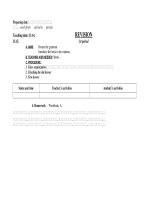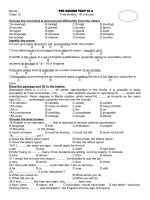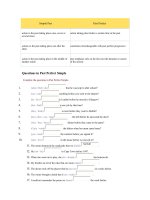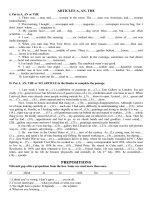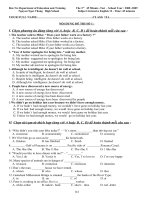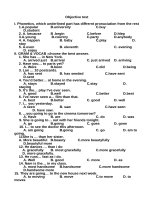Tieng Anh 12 (grammar)
Bạn đang xem bản rút gọn của tài liệu. Xem và tải ngay bản đầy đủ của tài liệu tại đây (338.15 KB, 45 trang )
Pham Thai Buong High School
The English Group
EXERCISES – English 12
Basic Level
Unit 1- Home Life
I. Choose the word which is pronounced or stressed differently from the three others
1. A. share B. rare C. are D. declare
2. A. cooks B. loves C. joins D. spends
3. A. teacher B. chore C. children D. school
4. A. advises B. goes C. devises D. raises
5. A. hands B. greets C. boys D. members
6. A. helps B. takes C. studies D. devotes
7. A. brothers B. weekends C. secrets D. problems
8. A. enjoys B. looks C. feels D. gives
9. A. shares B. attempts C. beliefs D. strikes
10. A. travels B. talks C. prepares D. believes
11. A. hospital B. mischievous C. supportive D. special
12. A. family B. attractiveness C. solution D. attempt
13. A. confide B. caring C. obedient D. secure
14. A. possible B. secondary C. suitable D. comfortable
15. A. marriage B. biology C. security D. tradition
II. Give the correct form of the verbs in brackets to complete the following sentences
1. The first train (leave) _________ the station a minute ago but the second (just, leave) __________
the station.
2. _____ you (finish) _________ (cook) ________ yet?
3. Andrea (do) ____________ her homework when the phone (ring) _________. But she (not
answer) ___________ the phone and (let) _________ it (ring) ________.
4. My uncle (be) ________ to many countries in Europe.
5. John (wash) ___________ his hands now. He (repair) ___________ his motorbike for hours.
6. _______ he (watch) _________TV at seven at home last night?
7. My mother (clean) ___________ three rooms. There are two left.
8. I (go) _______ there once a long time ago and I (not, be) _________ back since.
9. When Carol (call) _________ last night, I (watch) ___________ my favorite program on TV.
10. Sam (try) __________ to change a light bulb when he (slip) _________ and (fall) _________.
III. Give the correct form of the verbs in brackets to complete the following passage.
I (go) 1._______ to Germany with my parents for a holiday a couple of years ago. And it (be)
2.______ while we were there that I met Sonya. She was Swedish and the same age as me. We
(have) 3._____ a great time together and when the holiday (come) 4. _________ to an end, we
(decide) 5. _______ we would keep in touch and she would come to South Africa at Christmas. We
wrote, e-mailed, and (telephone) 6. _________ each other, sometimes two or three times a day.
I(miss) 7._______ her dreadfully and the three moths until Christmas (seem) 8._______ ages away.
I guess it must have been some time during November when I (not, hear) 9. __________ from her
for a couple of days. I (ring) 10. ________ her home and in the end her mother answered the
phone. She said Sonya (not, want) 11. __________ to speak to me as she (be) 12. _______ busy. I
(not, believe) 13. __________ her so I (write) 14. ________ a long letter asking her to explain what
(go) 15. ___________ on. I never heard back and of course she never came to South Africa. I still
think about her and wonder what she is doing.
1
Pham Thai Buong High School
The English Group
SENTENCE TRANSFORMATION
A. Adjective Clauses
1. With WHO, WHOM, WHICH, THAT, WHOSE
SUBJECT PRONOUNS
who, which, that
The student is from China. He sits next to me.
- The student who sits next to me is from China.
- The student that sits next to me is from China.
OBJECT PRONOUNS
who(m), which, that
I liked the woman. I met her at the party last night.
- I liked the woman who(m) I met at the party last night.
- I liked the woman that I met at the party last night.
- I liked the woman ∅ I met at the party last night.
OBJECT OF A PREPOSITION
who(m), that, ∅
The man was very kind. I talked to him yesterday.
- The man to who(m) I talked yesterday is very kind.
- The man who(m) I talked to yesterday is very kind
- The man that I talked to yesterday is very kind.
- The man ∅ I talked to yesterday is very kind.
POSSESSIVE
Whose
I know the boy. His bicycle was stolen.
- I know the boy whose bicycle was stolen.
I have a chair. One leg of which is broken.
- I have a chair whose one leg is broken.
EXAMPLE
Use the following sets of words and phrases to write complete sentences.
I want / speak / person / deals with / my account.
Dr Doran / secretary / resign / two weeks ago / have / had / do all / own typing
2. With
WHERE, WHEN
where = in which
The building is very old. He lives there.
The building in which he lives is very old.
The building where he lives is very old.
when = on which / at which
I’ll never forget the day. I met you then.
I’ll never forget the day when I met you.
I’ll never forget on which I met you.
EXAMPLE
Use the following sets of words and phrases to write complete sentences.
I / work / full-time / days / I / not / have classes
beach / be / place / I / like most / be / summer
2
Pham Thai Buong High School
The English Group
B. Noun clauses
1)
NOUN CLAUSE + VERB + COMPLEMENT
That he will succeed is certain.
What I need is a good long holiday.
2)
SUBJECT + VERB + NOUN CLAUSE
He said (that) he was glad of your success.
Experts agree that women learn languages more easily than men (do).
3)
SUBJECT + VERB + ADJECTIVE + NOUN CLAUSE
I was sure that I had left my keys on the counter.
It is necessary that all citizens comply with the new restrictions.
EXAMPLE
Use the following sets of words and phrases to write complete sentences.
What / annoy / me / way / he / boast / what / he / done
Louis / be / only person / understand / how / system work
It / true / car / cost / a lot / but it / good investment
C. Adverb Clauses
1. Adverb Clause of Time
CLAUSE +
when, until, while, before, after,
as soon as, just as, since, whenever
+ CLAUSE
My children had gone to bed when I came home.
I won’t believe you until I’ve seen it for myself.
2. Adverb Clause of Place
CLAUSE +
where
wherever
+ CLAUSE
We go fishing where we can find a lake.
He slept wherever he could find a hotel
3
Pham Thai Buong High School
The English Group
3. Adverb Clause of Condition
Type I: FIRST CONDITIONAL
If + Subject + Simple Present tense…+
will
can
may
+ [Verb in simple form]
If I have money, I will buy a new car.
If I see him at the meeting, I’ll give him your message.
Note:
unless = if not
It you don't come now, I am going to leave without you.
= Unless you come now, I’m going to leave without you
Type II: SECOND CONDITIONAL
If + Subject + Simple Past tense…+
would
could
might
+ [Verb in simple form]
If we caught the early train, we’d get there by lunch.
If I were to win the lottery, I’d buy another house.
Type III: THIRD CONDITIONAL
If + Subject + Past Perfect tense , S+
would
could
might
have + [Verb in past participle]
If we had known that you were there, we would have written you a letter.
If she had worked harder, she would have passed the exams.
4. Adverb Clause of Manner
CLAUSE +
as though,
as if, as
+ CLAUSE
He acts
as if
he were very sad.
The house was in such a mess - it looked
as though
a bomb had dropped on it.
5. Adverb Clause of Comparison
4
Pham Thai Buong High School
The English Group
CLAUSE +
as….as,
-er….than,
more….than
+ CLAUSE
The climate is not
as
bad
as
it would be.
Is the world a safer place
than
it was a year ago?
6. Adverb Clause of Reason
CLAUSE +
since, as, because
+ CLAUSE
I couldn’t phone you because I hadn’t got your number.
You should talk to Karen since she’s the one responsible for authorizing payments.
7. Adverb Clause of Result
CLAUSE +
so + adj. (adv.) + that
such (a/an) + noun + that
+ CLAUSE
New textbooks are
so expensive that
many students buy used ones.
He speaks to me in
such a way that
I always feel he is insulting me.
8. Adverb Clause of Purpose
CLAUSE +
so that, in order that
+ CLAUSE
We planned for a long time so that we had a good trip.
Regular checks are required in order that safety standards are maintained.
9. Adverb Clause of Concession
CLAUSE +
though, although,
even though
+ CLAUSE
He bought the tickets although the price was high.
Even though I have a master’s degree in business administration, I can’t fill out my tax form.
EXAMPLE
Use the following sets of words and phrases to write complete
sentences.
If I / see/ you / yesterday / I / take you / to / cinema
I / not / a child / but / sometimes / you / talk / me / as if / I / a
child
The examination / be / easy / than / we / expect
5
Pham Thai Buong High School
The English Group
We have / such / hard homework / I always / need / help
6
Pham Thai Buong High School
The English Group
SEQUENCES OF TENSES
A. Main verb in the Simple Present
If the main clause is then the dependent clause can be
Simple Present
(1) Present Progressive
(2) will, can, or may + verb
(3) Simple Past
(4) Present Perfect
(1)I see that Harriet is writing her composition.
Do you know who is riding the bicycle?
(2)He says that he will look for a job next week.
I know that she is going to win that prize.
Mary says that she can play the piano.
(3
)
I hope he arrived safely.
They think he was here last night.
(4)He tells us that he has been to the mountains before.
We know that you have spoken with Mike about the party.
B. Main verb in the simple past
If the main clause is
then the dependent clause can
be
Simple Past
(1) Past Progressive or Simple Past
(2) would, could, or might + verb
(3) Past Perfect
(1)
I gave the package to my sister when she visited us last
week.
Mike visited the Prado Art Museum while he was studying in
Madrid.
(2)He said that he would look for a job next week.
Mary said that she could play piano.
(3
)
I hoped he had arrived safely.
They thought he had been here last night.
EXAMPLE
Use the following sets of words and phrases to write complete
sentences.
Astronomers / predict / sun / die / about ten billion / year.
Though we / have / very difficult examination / last night, / I / do /
very well
7
Pham Thai Buong High School
The English Group
GERUNDS AND INFINITIVES
1. Verbs that are always followed by the infinitive
agree attempt claim decide demand desire
expect fail hesitate hope intend learn
need offer plan prepare pretend refuse
seem tend want wish
I
decided to write
a research essay.
I work hard and I think I
deserve to be
well paid.
Peter wished he’d never
promised to help
them.
2. Verbs that are always followed by the gerund
admit appreciate avoid can't help consider delay
deny enjoy finish imagine mind miss
postpone practice quit report resist risk
suggest
She enjoys
running
for competition.
Where possible, we
have avoided using
technical terms.
I
appreciated hearing
from them.
I
can't help worrying
about it
3. Verbs + preposition followed by the gerund
approve of count on depend on give up insist on keep on
rely on succeed in look forward to object to
I
object to paying
so much for milk.
His wife finally persuaded him to give up smoking.
4. Adjectives + preposition followed by the gerund
accustomed to afraid of capable of fond of intent on
interested in successful in tired of
I was
afraid of losing
my way.
5. Adjectives followed by the infinitive
anxious easy hard ready boring good
8
Pham Thai Buong High School
The English Group
pleased strange dangerous prepared usual difficult
common able
She’s upstairs getting
ready to go
out.
I’m not
prepared to listen
to excuses.
6. Verb + Noun/Pronoun followed by the infinitive
advise convince force order teach allow
hire permit tell ask instruct want
cause expect invite remind warn need
require
I taught him to swim.
They did not permit us to enter the area during the investigation.
They tried to convince him to buy a cheaper car.
My uncle is going to teach me to drive this summer.
7. Gerund or Infinitive
Here are verbs that can take either a gerund or infinitive. However,
some of them can be followed by either a gerund or an infinitive with
a difference in meaning.
begin can't stand remember
*
forget
*
start stop
*
dread prefer
*
hate try
*
continue like
*
regret love intend
He began shouting
abuse at them.
Suddenly the rain began to fall
.
PREFER
I prefer walking
to riding. (In general)
Let's take a bus. No, I prefer to walk
. (On a particular
occasion )
LIKE
I like eating
apples. (In general)
9
Pham Thai Buong High School
The English Group
I'd like to eat
an apple now. (At the moment)
STOP
He stopped talking
. (He didn't talk any more.)
He stopped to talk
. (He stopped doing something in
order to talk.)
REMEMBER
Remember to come tomorrow.
(Future action)
I remember hearing
this song before. (Past event)
FORGET
He forgot to write
a letter to me. (He didn't remember.)
I shall never forget seeing
the zoo for the first time.
(Forget: no longer have the memory of)
TRY
He'll try to meet
us at 4 o'clock. (try: make an attempt)
Try cleaning it with petrol. (try: make an experiment of)
EXAMPLE
Use the following sets of words and phrases to write complete sentences.
Mary / learn / swim / when / she / very young
I / really / looking forward to / work / with / you
10
Pham Thai Buong High School
The English Group
SENTENCE TRANSFORMATION
Structure 1.
• She’s a better tennis player than I am.
I don’t play tennis as well as she does.
• Britain isn’t as warm as Greece.
Greece is warmer than Britain.
EXAMPLE
Finish each of the following sentences in such a way that it means exactly the same
as the sentence printed before it.
• They don’t speak as fluently as we do.
We speak …………………………………………………………….
• No other city in Vietnam is so large as Ho Chi Minh city.
Ho Chi Minh city ………………………………………………….
Structure 2.
a)
•This song is simple enough for all of us to sing.
This song is so simple that all of us can sing it.
EXAMPLE
Finish each of the following sentences in such a way that it means exactly the same as
the sentence printed before it.
• He is rich enough to buy whatever he wants.
He is ………………………………………………………….
• Richard is tall enough to change light bulbs in some rooms without
having to stand on a chair.
Richard is ………………………………………………………
b)
11
Pham Thai Buong High School
The English Group
• The house was so expensive that my brother couldn't buy it.
The house was too expensive for my brother to buy.
EXAMPLE
Finish each of the following sentences in such a way that it means exactly the same as
the sentence printed before it.
• The water was so cold that the children could not swim in it.
The water …………………………………………………….
• He was so tired that he couldn't stay awake until the end of the film.
He was ……………………………………………………….
Structure 3.
• It’s wonderful to lie on the beach all day.
To lie on the beach all day is wonderful.
EXAMPLE
Finish each of the following sentences in such a way that it means exactly the same
as the sentence printed before it.
• It’s difficult to understand what she’s talking about.
To understand……………………………………………………
• It is very relaxing to spend a day in the country.
To spend…………………………………………………………
Structure 4.
Ex:
• I advise you not to see her again.
You’d better not see her again.
• You’d better think carefully before accepting the offer.
I advise you to think carefully before accepting the offer.
EXAMPLE
Finish each of the following sentences in such a way that it means exactly the same as
the sentence printed before it.
• I don’t think you should drink any more coffee.
You'd better ………………………………………………………….
• You had better begin by introducing yourself.
I advise……………………………………………………………….
Structure 5.
12
Pham Thai Buong High School
The English Group
• He’d rather watch TV than go out to the cinema.
He prefers watching TV to going out to the cinema.
EXAMPLE
Finish each of the following sentences in such a way that it means exactly the same as
the sentence printed before it.
• Alice would rather drink Coca-Cola than orange juice.
Alice prefers………………………………………………………….
• Jane would prefer to go to class tomorrow than today.
Jane would rather…………………………………………………….
Structure 6.
• He started working here three years ago.
He has worked here for three years.
EXAMPLE
Finish each of the following sentences in such a way that it means exactly the same as
the sentence printed before it.
• She last saw him when she was ten.
She hasn’t………………………………………………………
• The last time Jack went swimming was five years ago.
Jack hasn’t………………………………………………………
Structure 7.
• I can't see the play because it is sold out.
If the play were not sold out, I could see it.
• We didn't go on holiday because we didn’t have enough money.
If we had had enough money we would have gone on holiday.
EXAMPLE
Finish each of the following sentences in such a way that it means exactly the same
as the sentence printed before it.
• My brother didn't buy that car because he didn't have enough money.
If my brother……………………………………………………
13
Pham Thai Buong High School
The English Group
• He smokes too much; perhaps that's why he can't get rid of his cough.
If he didn’t smoke……………………………………………
Structure 8.
• She said, "The school opened a year ago."
She said the school had opened a year ago.
• 'You must wear a tie,' the teacher said.
The teacher told him he had to wear a tie.
Notes:
• Changes in tenses
Direct speech Indirect speech
Simple Present
Present Progressive
Simple Past
Present Perfect
**
Past Progressive
Simple Future (will + v)
Future Perfect (will have + v)
Present Conditional (would + v)
Simple Past
Past Progressive
Past Perfect
Past Perfect
**
Past Perfect Progressive
Present Conditional (would + v)
Perfect Conditional (would have +v)
Perfect Conditional (would have + v)
•
Changes in time and place
Direct speech Indirect speech
today
tonight
yesterday
the day before yesterday
tomorrow
the day after tomorrow
last week / year, etc
next week/year, etc
a year ago
these
come here
that day
that night
the day before / earlier
two days before
the next / following day
in two days’ time
the previous week/year, etc
the following week/year, etc
the previous year/ a year before
those
go there
a)
• The teacher said to us: “Did you understand my instructions?”
The teacher asked us if (whether) we had understood his instructions.
14
Pham Thai Buong High School
The English Group
EXAMPLE
Finish each of the following sentences in such a way that it means exactly the same as
the sentence printed before it.
• Tom said, “Can you remember where you put the dictionary, Mary? ”
Tom asked……………………………………………………
• My brother said to her, "Did you see George at the football match?"
My brother asked ……………………………………………
b)
• I said to her: “What do you mean?”
I asked her what she meant.
EXAMPLE
Finish each of the following sentences in such a way that it means exactly the same as
the sentence printed before it.
• ‘Where did you buy your shoes, Sally?’ asked Gail.
Gail asked………………………………………………………
• I said to my brother, "How much did you pay for these over ripe tomatoes?"
I asked…………………………………………………………….
c)
• He said to me: “Don’t believe everything she says”.
He told me not to believe everything she said.
EXAMPLE
Finish each of the following sentences in such a way that it means exactly the same as
the sentence printed before it.
• He said to the servant, “Please bring me some hot water".
He requested………………………………………………
• The teacher said to his student, "Don't be late tomorrow."
The teacher told………………………………………………
15
Pham Thai Buong High School
The English Group
Structure 9.
• You will be late for dinner if you don’t hurry.
You will be late for dinner unless you hurry.
EXAMPLE
Finish each of the following sentences in such a way that it means exactly the same as
the sentence printed before it.
• If you keep adding salt, you’ll spoil the dinner.
Unless you top……………………………………………………
• If it doesn’t rain soon, a lot of our crops will be lost.
Unless it rains …………………………………………………
Structure 10.
• My wife can't speak French.
I wish my wife could speak French.
• What a pity you failed your driving test.
I wish you hadn't failed your driving test.
EXAMPLE
Finish each of the following sentences in such a way that it means exactly the same as
the sentence printed before it.
• John never comes home before twelve o’clock.
I wish……………………………………………………………….
• He won’t give up smoking.
I wish……………………………………………………………….
Structure 11.
Present Simple: IS/ARE +
PAST PARTICIPLE
Past Simple: WAS/ WERE +
PAST PARTICIPLE
Present perfect: HAS BEEN /HAVE BEEN +
PAST PARTICIPLE
• Another doctor examined him yesterday.
He was examined by another doctor yesterday.
EXAMPLE
Finish each of the following sentences in such a way that it means exactly the same as
the sentence printed before it.
16
Pham Thai Buong High School
The English Group
• The police arrested two hundred people.
Two hundred people……………………………………………
• The secretary has just finished the report.
The report………………………………………………………
Present continuous: IS/ARE + BEING +
PAST PARTICIPLE
Past continuous: WAS/WERE + BEING
PAST PARTICIPLE
• Someone is interviewing Dr Johnson at the moment.
Dr Johnson is being interviewed at the moment.
EXAMPLE
Finish each of the following sentences in such a way that it means exactly the same as
the sentence printed before it.
• They were painting the outside of the ship when the accident happened.
The outside………………………………………………………
• Our teacher is going to punish that student.
That student……………………………………………………….
Structure 12.
• I’ll have my sister wash the car.
I'll have the car washed.
• George got a friend type all of his papers.
George got all of his papers typed.
EXAMPLE
Finish each of the following sentences in such a way that it means exactly the same
as the sentence printed before it.
• I’m going to have the barber cut my hair tomorrow.
I’m going to……………………………………………………….
• We’ll probably have someone paint our house next month.
We’ll……………………………………………………………….
Structure 13.
17
Pham Thai Buong High School
The English Group
• Though he was inexperienced, he got a good salary.
Despite his inexperience, he got a good salary.
• Although he was not guilty, they executed him.
In spite of his innocence, they executed him.
EXAMPLE
Finish each of the following sentences in such a way that it means exactly the same as
the sentence printed before it.
• Although his leg was broken, he managed to get out of his car.
Despite his…………………………………………………….
• Although the weather changed, the picnic went ahead as planned.
In spite of…………………………………………………………
Structure 14.
• Because she behaves well, everybody loves her.
Because of her good behavior, everybody loves her.
EXAMPLE
Finish each of the following sentences in such a way that it means exactly the same as
the sentence printed before it.
• As he has behaved badly, he must be punished.
Due to his………………………………………………………
• Since I can’t read Italian, I've had to have the book translated into
English
Because of………………………………………………………
Structure 15.
• We wrote the letter in 2 hours.
It took us two hours to write the letter.
EXAMPLE
Finish each of the following sentences in such a way that it means exactly the same as
the sentence printed before it.
• The flight to Hanoi lasts an hour and a half.
It takes…………………………………………………………….
• When Mary wanted a new car, she had to save up for a year.
It took.…………………………………………………………….
Structure 16.
18
Pham Thai Buong High School
The English Group
• Mary couldn’t speak until she was five.
It was not until Mary was five that she could speak.
EXAMPLE
Finish each of the following sentences in such a way that it means exactly the same
as the sentence printed before it.
• I didn't know how to use a computer until I was ten.
It was not………………………………………………………….
• The noise did not stop until after midnight.
It was not………………………………………………………
Structure 17.
• I haven’t seen her for three weeks.
It’s three weeks since I last saw her.
EXAMPLE
Finish each of the following sentences in such a way that it means exactly the same as
the sentence printed before it.
• We have known each other for 6 months.
It is ……………………………………………………………….
• John hasn't had his car repaired for over six months.
It is ……………………………………………………………….
Structure 18.
a) Yes / No Questions
• Did they all enjoy the party last night?
Do you know whether they all enjoyed the party last night?
EXAMPLE
Finish each of the following sentences in such a way that it means exactly the same
as the sentence printed before it.
• Do you agree with the comments I made about public transport?
Could you………………………………………………………
• Must we be here by six or can we come a little later?
We’d……………………………………………………………
19
Pham Thai Buong High School
The English Group
b) WH-Questions
• Where can I get something to drink?
Do you know where I could get something to drink?
EXAMPLE
Finish each of the following sentences in such a way that it means exactly the same as the
sentence printed before it.
• What time are you coming to the party?
Could you …………………………………………………….
• Which of the routes to London do they prefer?
Do you…………………………………………………………….
Structure 19.
• As it is hotter, I feel more miserable.
The hotter it is, the more miserable I feel.
EXAMPLE
Finish each of the following sentences in such a way that it means exactly the same as
the sentence printed before it.
• As T.V programmes become more popular, they seem to get worse.
The more…………………………………………………………….
• That worker works better when he does not have enough time.
The less……………………………………………………………….
Structure 20.
• "Why don't you buy them this picture as a wedding present, Sarah?"
said Robin.
Robin suggested that Sarah (should) buy them the picture as a wedding
present.
EXAMPLE
Finish each of the following sentences in such a way that it means exactly the same as
the sentence printed before it.
• "Why don't you apply for the job, Ann?" said Sue.
Sue suggested…………………………………………………….
• “Why don't you put an advertisement in the local paper?" they said to
me.
The suggested…………………………………………………….
20
Pham Thai Buong High School
The English Group
Structure 21.
• When I was a child, my father always read me a story at night before bedtime.
When I was a child my father used to read me a story at night before bedtime.
EXAMPLE
Finish each of the following sentences in such a way that it means exactly the same as
the sentence printed before it.
• I often did the gardening, but I don’t have time for it now.
I used to…………………………………………………
• My Aunt Susan always gave me a big kiss and pinch my cheek
when she came to my house.
My Aunt…………………………………………………………
Structure 22.
• John is accustomed to swimming every day.
John is used to swimming every day.
EXAMPLE
Finish each of the following sentences in such a way that it means exactly the same as
the sentence printed before it.
• The man is accustomed to reading his newspaper in the morning.
The man………………………………………………………
• John quickly became accustomed to the local food.
John is …………………………………………………………
Structure 23.
• He does not have a pen, and he does not have paper
He has neither a pen nor paper.
EXAMPLE
Finish each of the following sentences in such a way that it means exactly the same as
the sentence printed before it.
• John is not going to the beach today and his friends are not going to
the beach today.
Neither John……………………………………………………
• You can have tea, or you can have coffee.
You can…………………………………………………………
Structure 24.
21
Pham Thai Buong High School
The English Group
•
Both
oil
and
coal are irreplaceable natural resources.
Not only
oil
but also
coal is an irreplaceable resource.
EXAMPLE
Finish each of the following sentences in such a way that it means exactly the same as
the sentence printed before it.
•
Both
the library
and
the bookstore don’t have the book I need.
Neither the library… …………………………………………….
• He writes
not only
correctly
but also
neatly.
He writes………………………………………………………….
Structure 25.
• He has now recovered from his injury and can drive again.
He has now recovered from his injury and
is able to drive again
.
• She couldn't skate because of her foot problem.
She
wasn't able to skate
because of her foot problem.
• After six months, Jenny could play the violin quite well.
After six months, Jenny
was able to play the violin quite well
.
EXAMPLE
Finish each of the following sentences in such a way that it means exactly the same
as the sentence printed before it.
• The man could draw on the support of over 20,000 troops.
The man
………………………………………………………….
• Until you can repay some of your present debt, we cannot lend you
any more money.
Until you
…………………………………………………………
Structure 26.
• Could we use our dictionaries?
Do you mind if
I use our dictionaries?
• Can he come to class with me next week?
Do you mind if
he comes to class with me next week?
• May I register for the examination tomorrow?
Do you mind if
I register for the examination tomorrow?
EXAMPLE
22
Pham Thai Buong High School
The English Group
Finish each of the following sentences in such a way that it means exactly the same as
the sentence printed before it.
• Can I clean up the mess in the kitchen tomorrow?
Do you
…………………………………………………………….
• May I copy your notes from class yesterday?
Do you
…………………………………………………………
Structure 27.
• Could you answer my phone for me, Terry?
Would you mind answering my phone for me, Terry?
Would you please answer my phone for me, Terry?
• Will you mail this letter for me?
Would you mind mailing this letter for me?
Would you please mail this letter for me?
• Would you drive me to the doctor after work today?
Would you mind driving me to the doctor after work today?
Would you please drive me to the doctor after work today?
• Can you pick up some groceries?
Would you mind picking up some groceries?
Would you please pick up some groceries?
EXAMPLE
Finish each of the following sentences in such a way that it means exactly
the same as the sentence printed before it.
• Can you deliver one copy for me when you're finished?
Would you……………………………………………………
• Would you explain these instructions for the fax machine?
Would you………………………………………………………
Structure 28.
• You should get some experience before you start your own business.
You'd better get some experience before you start your own business.
EXAMPLE
Finish each of the following sentences in such a way that it means exactly
the same as the sentence printed before it.
• If you’ re not well, you ought to ask Ann to go instead.
If you’re………………………………………………………
• Kids, you should leave now, or you will miss the school bus.
Kids, you’d …………………………………………………….
23
Pham Thai Buong High School
The English Group
Structure 29.
• Let’s take the train.
Why don’t we take the train?
• Let’s stay at the youth hostel.
Why don’t we stay at the youth hostel?
EXAMPLE
Finish each of the following sentences in such a way that it means exactly
the same as the sentence printed before it.
• Let’s share the cost of accommodation.
Why don’t………………………………………………………….
• Let’s plan to meet when we both have free time.
Why don’t………………………………………………………….
24
Pham Thai Buong High School
The English Group
READING COMPREHENSION SKILLS
Skill 1: MAIN IDEA QUESTIONS
The passage:
Basketball was invented in 1891 by a physical education instructor in Springfield,
Massachusetts, by the name of James Naismith. Because of terrible weather in winter, his
physical education students were indoors rather than outdoors. They really did not like the
idea of boring, repetitive exercises and preferred the excitement and challenge of a game.
Naismith figured out a team sport that could be played indoors on a gymnasium floor, that
involved a lot of running, that kept all team members involved, and that did not allow the
tackling and physical contact of American style football.
The question:
What is the
topic
of this passage?
A. The life of James Naismith B. The history of sports
C. Physical education and exercise D. The origin of basketball
The first sentence of this passage states that
basketball was invented,
so the invention of
basketball is probably the topic. A quick check of the rest of the sentences in the passage
confirms that the topic is, in fact, the beginnings of the sport of basketball. Now you should
check each of the answers to determine which one comes closest to the topic that you have
determined. Answer A. mentions James Naismith but not basketball, so it is not the topic.
Answer B. is too general; it mentions sports but does not mention basketball. Answer C. is
also too general; it mentions physical education but does not mention basketball. The best
answer is therefore answer D.: the
origin of basketball
means that the way that
basketball
was invented
is going to be discussed.
If a passage consists of more than one paragraph, you should study the beginning of
each paragraph to determine the main idea. In a passage with more than one paragraph, you
should be sure to read the first sentence of each paragraph to determine the subject, topic,
title, or main idea.
The following chart outlines the key information that you should remember about main
idea questions.
MAIN IDEA QUESTIONS
25
